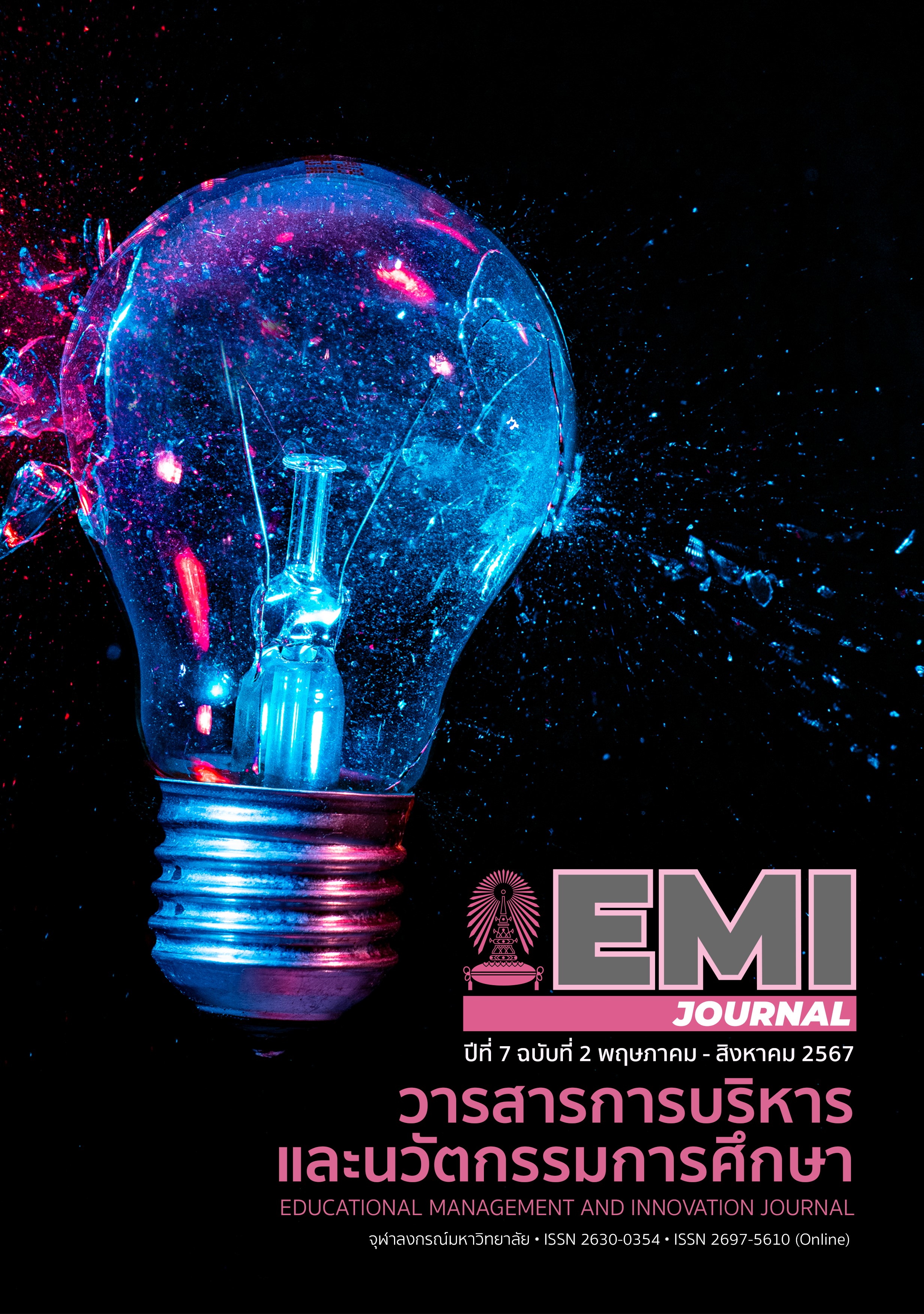Needs Assessment for Academic Management of Secondary Schools Based on the Concept of Intercultural Competence
คำสำคัญ:
Needs Assessment, Academic Management, Intercultural Competenceบทคัดย่อ
This study aimed to assess the needs of academic management of secondary schools based on the concept of intercultural competence (IC). This study used a population of 19 public secondary schools implementing international program (IP) under the Educational Hub Project. Respondents included school administrators and teachers, accounting for 307 respondents. A five-point Likert scale survey questionnaire was used to collect data. Data were analyzed using frequencies, percentages, mean, standard deviation, and modified priority needs index (PNImodified). Results showed that measurement and evaluation had the highest need compared to the other three functions, and teaching and learning had the lowest need. Among the ten components of IC, the top three highest needs included intercultural team effectiveness, interpersonal communication, and intercultural empathy, and the top three lowest needs included respect for otherness, intercultural goal orientation, and nonjudgmentalness.
Downloads
เอกสารอ้างอิง
Asawapoom, S. (2008). Modern educational administration: Concepts, theories, and practices (4th ed.). Ubon Ratchathani: Ubonkit Offset Printing. [In Thai]
Barrett, M. D. (2018). How schools can promote the intercultural competence of young people. European Psychologist, 23(1), 93-104. doi:10.1027/1016-9040/a000308
Bennett, J. M. (2009). Cultivating intercultural competence: A process perspective. In D. K. Deardorff (Ed.), The Sage Handbook of Intercultural Competence (pp. 121-140). Los Angeles: Sage Publication.
Bennett, M. (2013). Basic concepts of intercultural communication: Paradigms, principles, and practices. Boston: Intercultural Press.
Burrack, F. (2018). Authentic assessment. In B. B. Frey (Ed.), The SAGE Encyclopedia of Educational Research, Measurement, and Evaluation (pp. 149-151). Thousand Oaks, California: SAGE Publications.
Cabral, S. (2021, May 21). Covid ‘hate crimes’ against Asian Americans on rise. BBC. Retrieved from https://www.bbc.com/news/world-us-canada-56218684
Chitayawong, S. (2019). Report on the teach less learn more policy. Bangkok: Ministry of Education.
[In Thai]
Curtis, V., Moon, R., & Penaluna, A. (2020). Active entrepreneurship education and the impact on approaches to learning: Mixed methods evidence from a six-year study into one entrepreneurship educator’s classroom. Industry and Higher Education, 0(0), 1-11. doi:10.1177/0950422220975319
Deller, J., & Stahl, G. K. (2015). Assessment centers. In J. M. Bennett (Ed.), The SAGE Encyclopedia of Intercultural Competence (pp. 11-17). Los Angeles: Sage.
Eisenchlas, S., & Trevaskes, S. (2007). Intercultural competence: Examples of internationalizing the curriculum through students’ interactions. In D. Palfreyman & D. L. McBride (Eds.), Learning and Teaching Across Cultures in Higher Education (pp. 177-192). London: Palgrave Macmillan UK.
Eriksen, E. (2018). Promoting intercultural competence in the English classroom by using the novel: Does my head look big in this? [Unpublished master’s thesis]. Østfold University College., Retrieved from https://hiof.brage.unit.no/hiof-xmlui/bitstream/handle/11250/2502086/18-00497-5%20The %20Master%20Thesis,%20Elisabeth%20Eriksen%20(1)%20336561_1_1.pdf?sequence=1
Faber, C. F., & Shearron, G. F. (1970). Elementary school administration: Theory and practice. Holt, Rinehart and Winston.
Hajisoteriou, C., & Angelides, P. (2016). Conceptions of intercultural education from around the globe. In C. Hajisoteriou & P. Angelides (Eds.), The globalisation of intercultural education: The politics of macro-micro integration (pp. 35-64). London: Palgrave Macmillan UK.
Hanada, S. (2019). A quantitative assessment of Japanese students’ intercultural competence developed through study abroad programs. Journal of International Students, 9(4), 1015-1037. doi:10.32674 /jis.v9i4.391
Hong, Y.-Y., & Cheon, B. K. (2017). How does culture matter in the face of globalization? Perspectives on Psychological Science, 12(5), 810-823. doi:10.1177/1745691617700496
INCA project team. (2004). The INCA project: Intercultural competence assessment. Retrieved from https://ec.europa.eu/migrant-integration/librarydoc/the-inca-project-intercultural-competence-assessment
Machado, L., Klein, A. Z., Freitas, A., Schlemmer, E., & Pedron, C. D. (2016). The use of virtual worlds for developing Intercultural Competences. International Journal of Information and Communication Technology Education, 12(3), 51-64. doi:10.4018/IJICTE.2016070105
Matveev, A. V. (2002). The perception of intercultural communication competence by American and Russian managers with experience on multicultural teams. [Doctoral dissertation, Ohio University Ann Arbor]. ProQuest Dissertations & Theses Global database. (3062639)
Ministry of Education. (2007). Ministerial regulations: Prescribe the criteria and methods for decentralization
of educational administration and management. Retrieved from http://backoffice.onec.go.th/ uploaded/Category/Laws/RuleMetDistEdMnt2550-02-12-2010.pdf [In Thai]
Office of Basic Educaiton Commission. (2020). Information on Student Acceptance from the Development of Thailand as an Educational Hub in the Region Project. Retrieved from https://www.obec. go.th/archives/218601 [In Thai]
Office of Basic Education Commission. (2017). Announcement of the Office of the Basic Education Commission: Recruitment of students in special classrooms of the project of developing Thailand as a regional education hub, academic year 2018. https://www.kkzone1.go.th/ administrator-control/data/003/04-12-2017-17-23-52_1130137788.pdf [In Thai]
Pooprasert, K. (2002). Academic administration in schools (2nd ed.). Bangkok: Tips Publication. [In Thai]
Sercu, L. (2010). Assessing intercultural competence: More questions than answers. In A. Paran & L. Sercu (Eds.), Testing the Untestable in Language Education (pp. 17-34).
Songkitipisal, I. (2020). Secondary schools academic management strategies based on the concept of entrepreneurial leadership competencies. [Doctoral dissertation, Chulalongkorn University]. Retrieved from https://cuir.car.chula.ac.th/handle/123456789/76691
Srisaat, B. (1996). Interpretation when using the estimation scale data collection tool. Journal of Educational Measurement Mahasarakham University, 2(1), 64-70.
Upper Secondary Education Bureau. (2017). Driving Thai Secondary Education 4.0 for Employment in the 21st century. Bangkok: The Agricultural Co-operative Federation of Thailand.
Wahachat, R. (2007). Academic administration of basic education institutions. Bangkok: Book Center, Thaksin University. [In Thai]
Wonganutaroj, P. (2010). Academic administration. Samut Sakhon: Pimdee. [In Thai]
Zhang, X., & Zhou, M. (2019). Interventions to promote learners’ intercultural competence: A meta-analysis. International Journal of Intercultural Relations, 71, 31-47. doi:https://doi.org/10.1016/ j.ijintrel.2019.04.006
ดาวน์โหลด
เผยแพร่แล้ว
ฉบับ
ประเภทบทความ
สัญญาอนุญาต
ลิขสิทธิ์ (c) 2024 วารสารการบริหารและนวัตกรรมการศึกษา

อนุญาตภายใต้เงื่อนไข Creative Commons Attribution-NonCommercial-NoDerivatives 4.0 International License.



